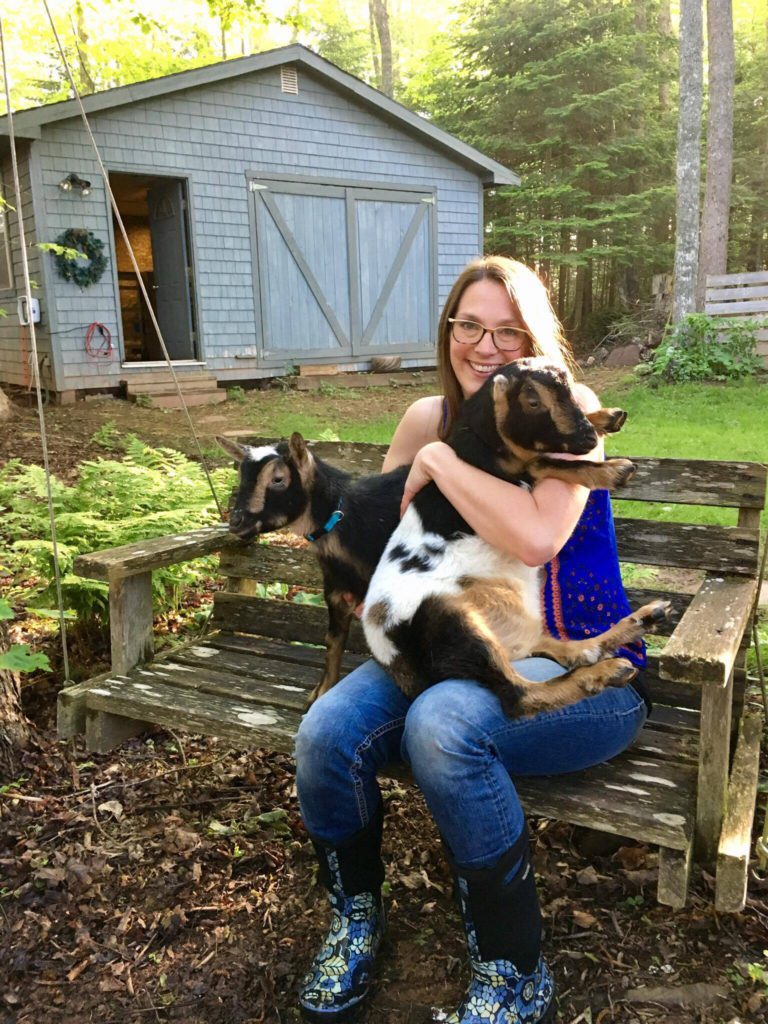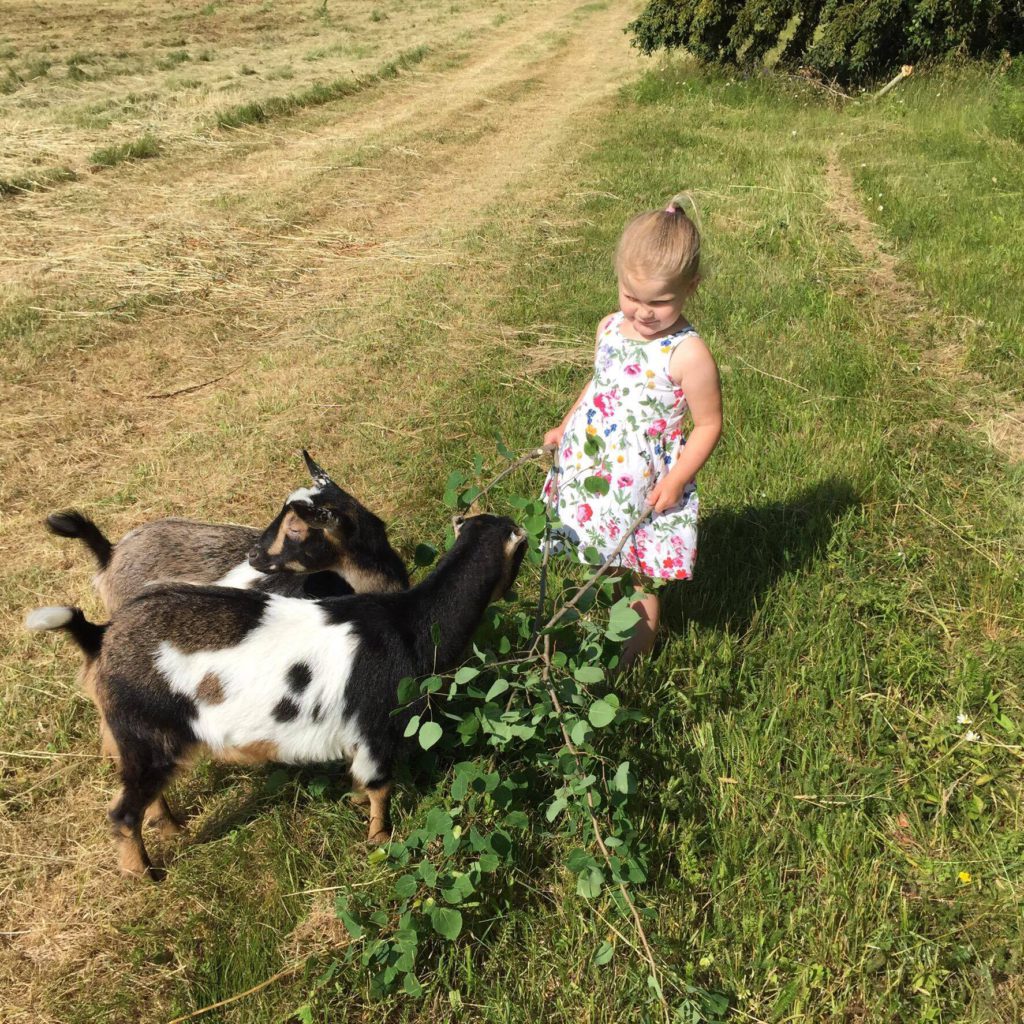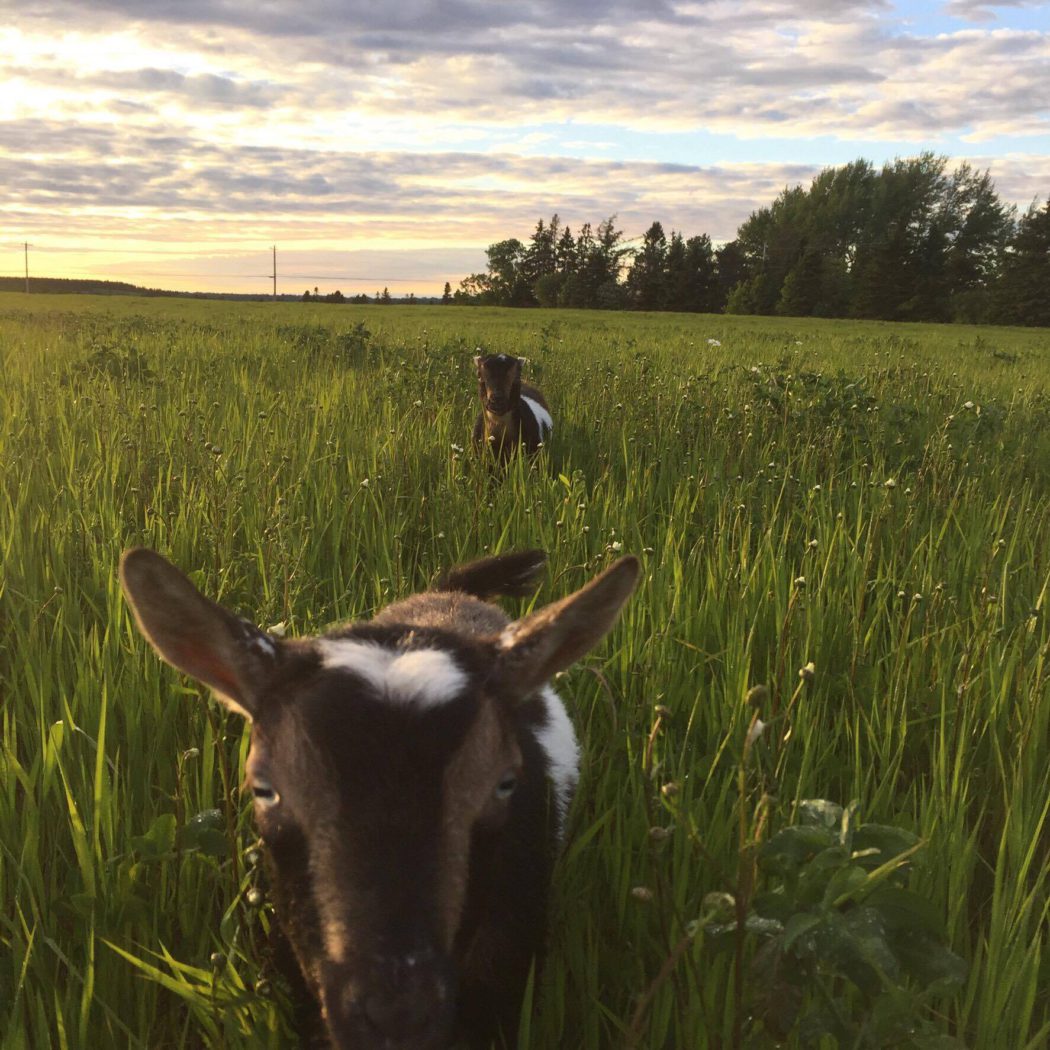Bylaws in some Island municipalities make it difficult for residents to pursue food security and sustainability goals
With food prices ever increasing and a growing disconnect from farming, many Islanders are taking it upon themselves to regain some control over their food supply. While backyard gardens are the most common means of doing so, backyard animals are gaining popularity, with eggs and milk being the coveted, protein-rich end products. Some Islanders, however, are facing bylaws that fly in the face of their food production endeavours. The Abbotts of Cornwall are one such family. In June 2017 they were ordered to remove Mary and Martha, their two miniature goats, from their property in the town.
The Abbott family moved to Cornwall in 2014 with the dream of transforming their large lot into a small hobby farm.
“We really wanted to have a sustainable lifestyle and teach our children where their food comes from, and to produce as much of it here on our property as possible. Not meat, but we wanted goats for milk and chickens for eggs, and for manure, for compost,” Rosalyn Abbott said, who had previously kept chickens in Summerside on a property much smaller than their Cornwall lot, with the required permit from the city.

Rosalyn Abbot with Martha and Mary, her mini goats//Submitted Photo
However, unlike the urban centres of Charlottetown and Summerside, which allow some small livestock on residential property, many rural municipalities on PEI ironically have no provision for livestock of any sort.
“[We learned that] we were not allowed to have any agricultural activity, which includes the keeping of livestock such as goats, ducks, chickens and actually rabbits, which many people don’t know are listed as agricultural animals on PEI,” Abbott said. The Abbott home sits on one acre of land outside the main town, alongside two other single-family dwellings, but is otherwise surrounded by agricultural fields in active cultivation.
Over the past three years the family has approached the town from every possible angle. “I asked to have our property rezoned from residential to rural residential, where small animals would be permitted,” Abbott said. Her application was defeated by the majority of councillors. She was told the rezoning did not fit with the overall development plan for the town.
“I disagree with that, because in the town plan it talks about Cornwall’s agricultural heritage and how important it is to balance rural interests and values as much as urban interests and values,” Abbott said. “The other reason, which was mentioned in a more informal way, was that [the livestock] would smell or may smell, and that would be a problem. It’s sort of a funny reason to give us, because these agricultural fields [surrounding my home] spread manure so that can smell quite strong.”
Abbott next drafted a petition in support of a variance order, which is where council grants an exception to a bylaw without changing the bylaw. When submitted to town council in March 2016, the petition was supported by 320 Islanders. “[The town council] wouldn’t allow me to present it in person, though I could be there as an observer.”

Submitted Photo
In March 2017, Abbott decided to move forward with purchasing two miniature goats. “I had been told off the record, by two different town councillors, that I should have just done it, and asked forgiveness instead of permission,” said Abbott, who admits that they didn’t follow the town’s rules but did adhere to rules set out by other municipalities. “So we bought miniature goats, we got females, they are disbudded which means they will never grow horns, we kept a small ratio, just two, in a much larger pen than most city guidelines suggest. In the building, it is insulated so people can’t hear them.”
Abbott was not surprised when she received a phone call from the town’s planning officer who’d received an anonymous letter about the goats. “It wasn’t a complaint. It didn’t say anything about noise or smell. It just said there are goats at this address so you should look into it,” Abbott said. In early June, Abbott received a registered letter. “[It stated] that if we didn’t get rid of the goats on or before June 30th that we would face fines and potential prosecution.”
The family is “very disappointed” but will comply with the town’s ordinance. “We’ve found a home for them to live in temporarily. They are still ours; we don’t want to sell them. They are going to live down the road [in an area that is] zoned in such a way that they are legal there.”
“What I’ve taken from this is: Cornwall’s goals for its future and our lifestyle objectives just don’t meet. For us, sustainable living is integral to our family well-being. But I think it’s sad, even more than just for our family, for the residents who would maybe like to reduce their footprint slightly and experience what it’s like to raise your own eggs from your own hens who call to you each morning when you go out and incorporate that compost into your soil to grow really nice tomatoes. And they can’t. And I think that is really sad,” said Abbott.
The Town of Cornwall was contacted repeatedly but did not respond to Salty’s requests for an interview about this issue.
Bylaw Review Coming for Borden-Carleton
In 2011, Julie Hamilton of Borden-Carleton was forced to remove four hens from her backyard on the Trans-Canada Highway. “We didn’t let our chickens run free or anything. They were contained at all times, in a chicken ark, that we moved around on our lawn. We had them through the summer and then it was wintertime so we moved them into our garage so they would be warmer. A bylaw officer stopped by and gave us a notice and told us that we had to get rid of our chickens within a week. So that was very strange because none of our neighbours had complained to us at all and it was just kind of out of the blue.”
Good news may be on the horizon. “There is a new municipal act coming in the fall of 2017 and we will be redoing the bylaws on the books around the same time,” Ken Coady, Borden-Carleton’s chief administrative officer, said. This will include animal control and zoning bylaws which affect backyard livestock. The bylaw review process will include a public consultation process open to all residents.
Hamilton is hopeful she may once again be able to have hens at her Borden-Carleton home.
- BURGERS TO BLOSSOMS AT GARDENS OF LIFE - April 1, 2019
- SIGNED, SEALED AND DELIVERED - February 1, 2018
- What a Waste? - January 1, 2018
- A New Face For a Familiar Tignish Tradition - December 1, 2017
- Cultivating a Forest of Food - November 1, 2017
- Our Day on the COPC Farm Tour - August 1, 2017
- Municipal Bylaws Prohibit Livestock - August 1, 2017
- The Sky is Falling, The Sky is Falling! Or, is it? - July 1, 2017
- No Summer Break For Childhood Hunger on PEI - July 1, 2017
- Creating Community - May 1, 2017

